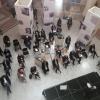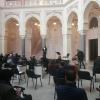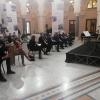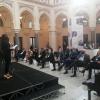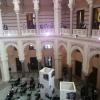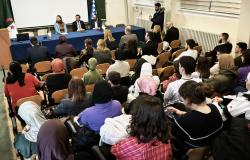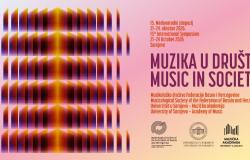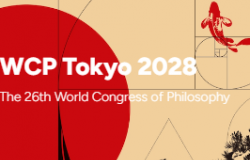International Scientific Conference "Genocide against Bosniaks, Srebrenica 1995 - 2020 - Causes, Scales and Consequences" Opened in the City Hall
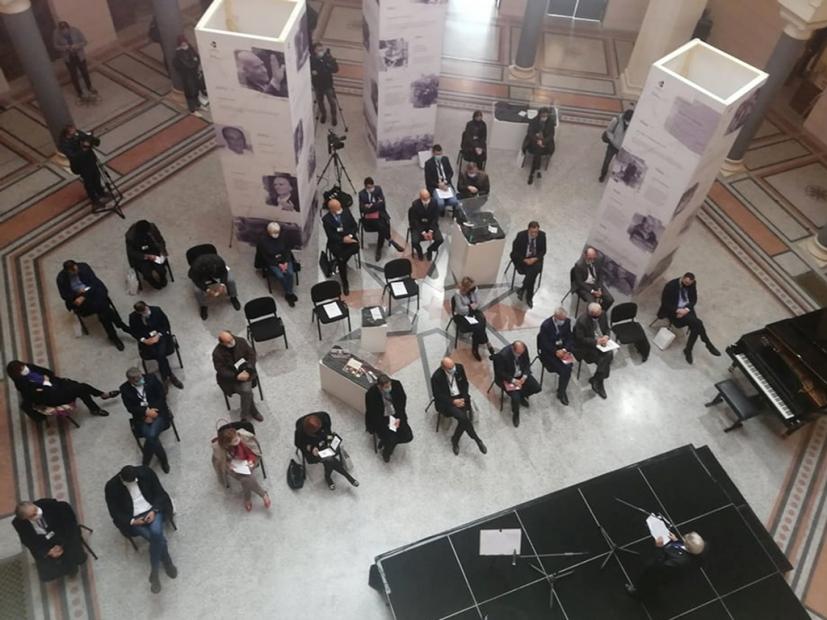
The International Scientific Conference "Genocide against Bosniaks, Srebrenica 1995-2020: Causes, Scales and Consequences" was officially opened in the City Hall on Monday, 19 October 2020.
On the occasion of marking the twenty-fifth anniversary of the genocide against the Bosniaks of the Republic of Bosnia and Herzegovina, which was confirmed by the ICTY court rulings for the so-called the United Nations safe zones of Srebrenica and its surroundings (July 1995), the University of Sarajevo, the University of Tuzla, the Institute for Research on Crimes against Humanity and International Law, University of Sarajevo and the Institute for History, University of Sarajevo organized this International Scientific Conference.
The conference was opened with speeches by Prof. Dr. Rifat Škrijelj, University of Sarajevo Rector, Prof. Dr. Nermina Hadžigrahić, University of Tuzla Rector, academician Prof. Dr. Miloš Trifković, President of the Academy of Sciences and Arts of Bosnia and Herzegovina, Mr. Jasmin Halebić, Minister of Finance of Sarajevo Canton, Dr. Emir Suljagić, Potočari Memorial Center Director, Mrs. Vildana Selimbegović, editor-in-chief and director of "Oslobođenje", Academician Prof. Dr. Mirko Pejanović, President of the Scientific Committee of the Conference, Prof. Dr. Rasim Muratović, Institute for Research of Crimes against Humanity and International Law, University of Sarajevo Director, and by reading letters of support sent by Reisu-l-ulema of the Islamic Community in BiH Husein ef. Kavazović and Mr. Valentin Inzko, High Representative for Bosnia and Herzegovina.
During the address, the speakers emphasized that a reminder of genocide is necessary.
University of Sarajevo Rector Prof. Dr. Rifat Škrijelj pointed out that such conferences are one of the obligations of the academic community, to educate young generations on the basis of exact evidence and important facts, and to remind the public of the fundamental values of human life.
“Srebrenica - as a monument of sorrow and a symbol of loss of human dignity - unfortunately, even 25 years after the genocide and mass crimes against Bosniaks in the most cruel way, which the history of war does not remember, is the subject of numerous and various historical falsifications for political and ideological reasons, still institutionally denying genocide. That is why I think that such conferences are very important, because not only do they give a scientific valorization of irrefutable facts established at the highest courts in The Hague, but they also look at this event from the historical, social, psychological, medical and biological side” said Rector Škrijelj.
The University of Tuzla Rector, Prof. Dr. Nermina Hadžigrahić pointed out the importance of a comprehensive view of the events in and around Srebrenica, herself being a witness to the crimes committed in that eastern Bosnian town, said that Srebrenica had become synonymous with human suffering and suffering, a dark moment for humanity.
The scientific elements of genocide, including its legal, sociological and numerous other aspects were elaborated in detail by the Academy of Sciences and Arts of Bosnia and Herzegovina President, Academician Prof. Dr. Milos Trifković, emphasizing that this is a phenomenon that requires every kind of social caution. In that context, he pointed out that genocide opposes the very foundations of humanism and civilization, threatening the foundations of humanity and modern tendencies of interpenetration of cultures, and that the negative effects of genocide against Bosniaks in BiH act synergistically and produce multiple consequences, including attempts to destroy Bosnia and Herzegovina. “That is why it is necessary to study genocide scientifically and monitor its consequences. This is our permanent obligation”, emphasized Academician Trifković, and pointed out that the politics of forgetting must not be allowed to overpower the culture of memory.
Director of the Srebrenica - Potočari Memorial Center, Dr. Emir Suljagić assessed that the conference is an opportunity to talk about Srebrenica outside of July, the month in which the anniversary of the genocide in that city is marked. “The judicial truth about what happened here has been established in international and domestic courts, and it is as it is. Some may like it, some may not like it, but it is like that, and what is ahead now and what it seems to me we do not understand clearly enough, is that the period of writing historical truth is yet to come” said Suljagić.
Academician Prof. Dr. Mirko Pejanović stated “As the attitude towards the committed genocide in Srebrenica is a primary ethical issue and the issue of humanism of the domestic, European and world community towards the survivors of Srebrenica, scientists advocate new initiatives in changing the attitude towards the crime of genocide in Srebrenica. These changes should be reported in the culture of remembrance in order for the new generations to be systematically acquainted with what happened in Srebrenica in 1995 through the education system.” He added that a change is also needed in the treatment of state authorities and individuals holding public office in Bosnia and Herzegovina who deny genocide against Bosniaks in Srebrenica.
Institute for Research of Crimes against Humanity and International Law Director, Prof. Dr. Rasim Muratović said the aim of the conference was to make a scientific contribution to what happened in Srebrenica in July 1995, including a 'written trace' in the form of a collection of papers, which would, among other things, result in its work.
A letter of support from the reis-l-ulema of the Islamic Community in BiH, Hussein ef. Kavazović was read at the conference. Kavazović stated that he supports the efforts to grant Srebrenica a special status - not only in Bosnia and Herzegovina, but also throughout Europe, because of everything that has been done to it, which has turned it into a symbol of suffering.
The letter of support was sent, among others, by the High Representative in BiH Valentin Inzko, recalling the verdicts of domestic international courts establishing genocide in and around Srebrenica, and calling for building the state of BiH that its citizens deserve - peaceful, tolerant and stable.
The conference is attended by 72 exhibitors from the country and abroad, and during the conference there will be four panel discussions organized in accordance with epidemiological measures.
As part of the conference, the famous Bosnian academic painter Irfan Hozo made a special exhibition dedicated to the victims of the Srebrenica genocide, which was set up in the City Hall.
“This conference which will be attended by over seventy scientists and researchers from twelve countries among other things is an opportunity to exchange experiences on genocide in Bosnia and Herzegovina, its causes, scale and consequences, which means the responsibility of scientists and the entire intellectual the public. When we think of Srebrenica, we think of Bosnia and Herzegovina, its reconstruction and future. The issue of genocide in Srebrenica is a matter of conscience of all humanity” was stated the Conference Organizing Committee members.




